SUMMARY
This is AI generated summarization, which may have errors. For context, always refer to the full article.
![[OPINION] Filipinos, unite to defend our community pantries!](https://www.rappler.com/tachyon/2021/04/TL-defend-community-pantries-1280.jpg)
What started off as a makeshift bamboo cart with alcohol, crackers, fresh produce, and other essentials on display, now widely known as the Maginhawa Community Pantry, has become a very big statement – and commentary – of the current affairs of our nation.
Just hours from its inception, communities from all over the country came up with their own versions of the pantry, all a result of volunteerism and solidarity. Some who cannot, for various reasons, leave their houses, donate money. Others do grocery runs and give in-kind donations. Activist, Church, and religious groups have also set up their own pantries. The poor – the masa – have also been giving to the poor.
These community pantries have a common motto: “Magbigay ayon sa kakayahan. Kumuha batay sa pangangailangan.” (Give whatever you can. Take only what you need.)
Marxian and Christian sources
The motto used by the pantries is well-known to social activists, as it was Karl Marx that popularized it in his 1875 Critique of the Gotha Program, Gotha being a town in Germany where the Social Democratic Workers’ Party of Germany was meeting and adopting a political program that Marx thought was too conservative. The full quote states:
“In a higher phase of communist society, after the enslaving subordination of the individual to the division of labor, and therewith also the antithesis between mental and physical labor, has vanished; after labor has become not only a means of life but life’s prime want; after the productive forces have also increased with the all-around development of the individual, and all the springs of co-operative wealth flow more abundantly — only then can the narrow horizon of bourgeois right be crossed in its entirety and society inscribe on its banners: From each according to his ability, to each according to his needs!”
It must be noted that this was not an original idea of Marx but it is something he borrowed from the French Utopian socialists. What Marx provided was a solid analysis that helped activists understand the roots of the problem of alienation and injustice in feudalism and capitalism.
Others would go back much earlier and point to the early Christians as a source of this idea, thus in the Acts of the Apostles, we read these passages:
“All the believers were together and had everything in common. Selling their possessions and goods, they gave to anyone as he had need.” (Acts 2, 44–45)
“All the believers were one in heart and mind. No one claimed that any of his possessions were his own, but they shared everything they had.” (Acts 4, 32)
“There were no needy persons among them. For from time to time those who owned lands or houses sold them, brought the money from their sales and put it at the apostles’ feet, and it was distributed to anyone as he had need.” (Acts 4, 34–35)
In the 21st century, it is Pope Francis who articulated this vision best. In “Fratelli Tutti,” his encyclical on solidarity and social friendship issued last year in the midst of the pandemic, Francis shares a secret and a dream:
“Here we have a splendid secret that shows us how to dream and to turn our life into a wonderful adventure. No one can face life in isolation…. We need a community that supports and helps us, in which we can help one another to keep looking ahead. How important it is to dream together.… By ourselves, we risk seeing mirages, things that are not there. Dreams, on the other hand, are built together. Let us dream, then, as a single human family, as fellow travelers sharing the same flesh, as children of the same earth which is our common home, each of us bringing the richness of his or her beliefs and convictions, each of us with his or her own voice, brothers and sisters all.”
Community-level solidarity
The concept of community pantries bring to light not simply charity, but more importantly, solidarity and mutual aid. When the community pantries first gained traction, farmers from Paniqui, Tarlac donated sacks of sweet potatoes to the Maginhawa pantry, and fishermen belonging to the Pamalakaya Fedration brought fish. Local Tricycle Operators and Drivers’ Associations, in spite of being hard hit by the pandemic, volunteered to organize the donations and ensure that those who are lining up are observing minimum health protocols. Others help in a variety of other ways – packing, distributing, and arranging goods.
Beyond the donations given and the monetary assistance provided is the narrative of the solidarity of people on the ground – those who, despite being most affected by the pandemic and despite having faced great losses, go out of their way to assist those in their community.
A criticism is that these community pantries are political, with both the national government and local officials threatened by their emergence.
Of course it is political. If it were not for the inability of the government to provide social services and aid, communities would not have had the need to come together and provide for themselves. Instead, therefore, of asking “Why do we have to make this a political issue? Why are we talking about socialism?” we should be asking ourselves, “Why and how have our current set-ups failed us? What is so wrong about equitably distributing wealth and giving free access to services and goods?”
Not just a feel good moment
For many of us, the first thing we probably felt when we saw the community pantries increase in number was a feeling of warmth. After all, it is the bayanihan spirit we are widely known for at work. Upon further reflection, however, we have to think deeply about the reasons why these community pantries came up in the first place and what we can do from here.
We have to acknowledge that this a concrete result of insufficient governmental aid, and so we have to keep clamoring for it. This is not a free pass for government that is not delivering hospital rooms and vaccines to its people.
Certainly, the pantries are not a panacea for all our problems. The social injustice that the pandemic has laid bare and exacerbated cannot be overcome through these pantries; political power to change government priorities and transform corporate behavior is essential for that. Setting up or contributing a community pantry should not be an excuse for not acting politically on the pretext that one has made a sufficient contribution.
Pope Francis points out in “Fratelli Tutti” that anyone who thinks that the only lesson to be learned in this pandemic is the need to improve what we were already doing, or to refine existing systems and regulations, denies reality.
We need radical change in our society – in our governance and economy especially – and we need it now.
A call to solidarity
As we write this article, we are seeing that the pantries, like many other good things in our society (the Lumad schools, for example) have been red-tagged – out of ignorance and out of malice. The Maginhawa Community Pantry, for instance, has had to shut down operations momentarily because its founder, Patricia Non, feared for the safety of the pantry’s volunteers amid red-tagging. She made this announcement Monday night on Facebook, attaching screenshots of social media groups, including that of the NTF-ELCAC’s, saying that the pantries are used for communist propaganda.
Some police officers in other community pantries have also been reported as having visited different sites in Manila, asking for names of the organizers and whether the organizers are affiliated with any organization. This is a violation of the constitutional rights of citizens, including the right to privacy as National Privacy Commission Commissioner Raymond Liboro has pointed out.
To the community pantries out there, lawyers are now organizing to support you and fight the red-taggers.
If this is the policy of the Duterte government (they have denied it), it must be condemned in the strongest terms. It only exposes the insecurity of an administration that has not been able to provide for its people.
The pantries are great efforts because they meld together social activism and social entrepreneurship at the community level. The combination of these two communities of practice – those who protest against and work to defeat injustice and those who use social innovation to change society – is powerful. This coalition of change-makers is our best chance to come out of the pandemic not just surviving but thriving.
We call on all Filipinos of good will, including our politicians (Quezon City Mayor Joy Belmonte has risen to the occasion), to band together and defend these community pantries. To paraphrase another famous quotation of Marx: Filipinos all over the world, unite to defend our right to be kind and to be in solidarity! – Rappler.com
Tony La Viña teaches law and is former dean of the Ateneo School of Government.
Joy Reyes is a collaborator of La Viña’s. She graduated from the University of the Philippines College of Law.
Voices features opinions from readers of all backgrounds, persuasions, and ages; analyses from advocacy leaders and subject matter experts; and reflections and editorials from Rappler staff.
You may submit pieces for review to opinion@rappler.com.
Add a comment
How does this make you feel?
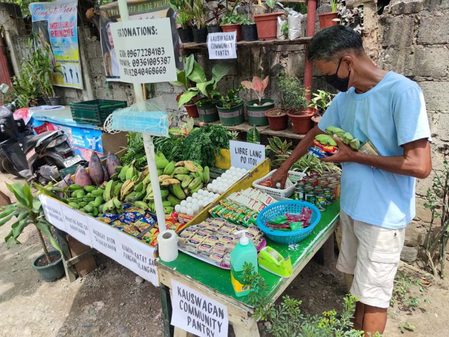
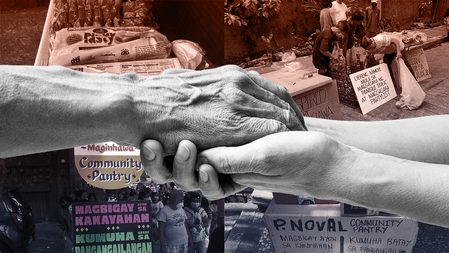
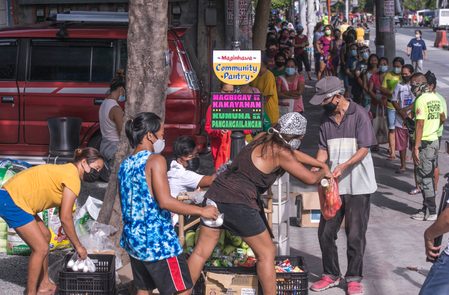

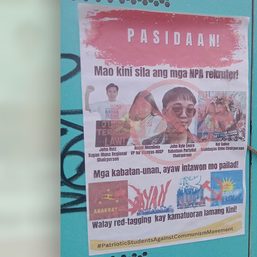

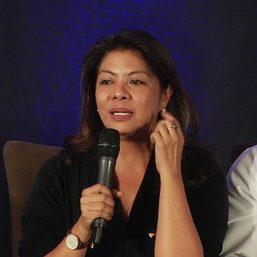
![[OPINION] Jhed and Jonila’s fight for justice](https://www.rappler.com/tachyon/2024/02/TL-jhed-and-jonilla.jpg?resize=257%2C257&crop=411px%2C0px%2C1080px%2C1080px)
There are no comments yet. Add your comment to start the conversation.